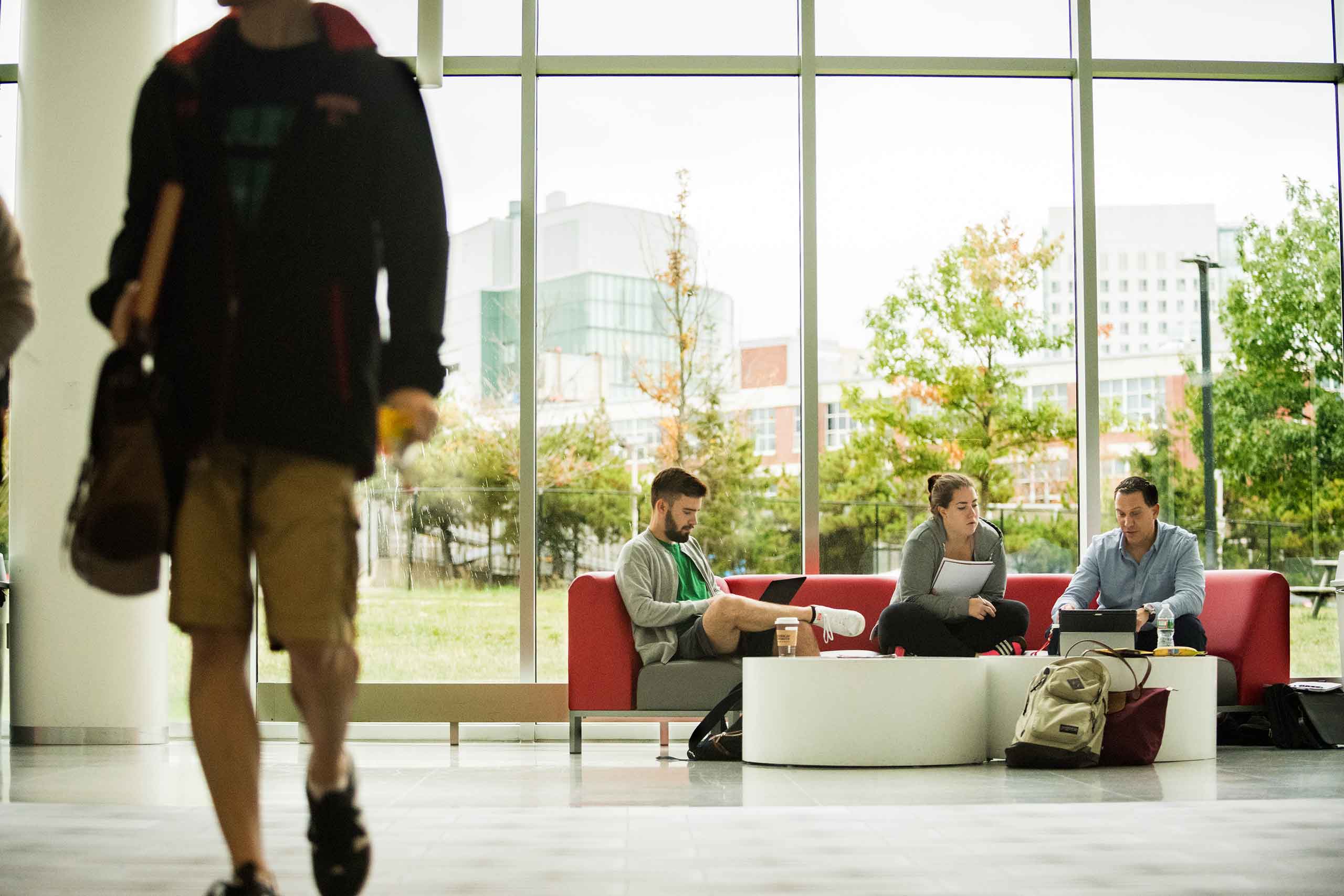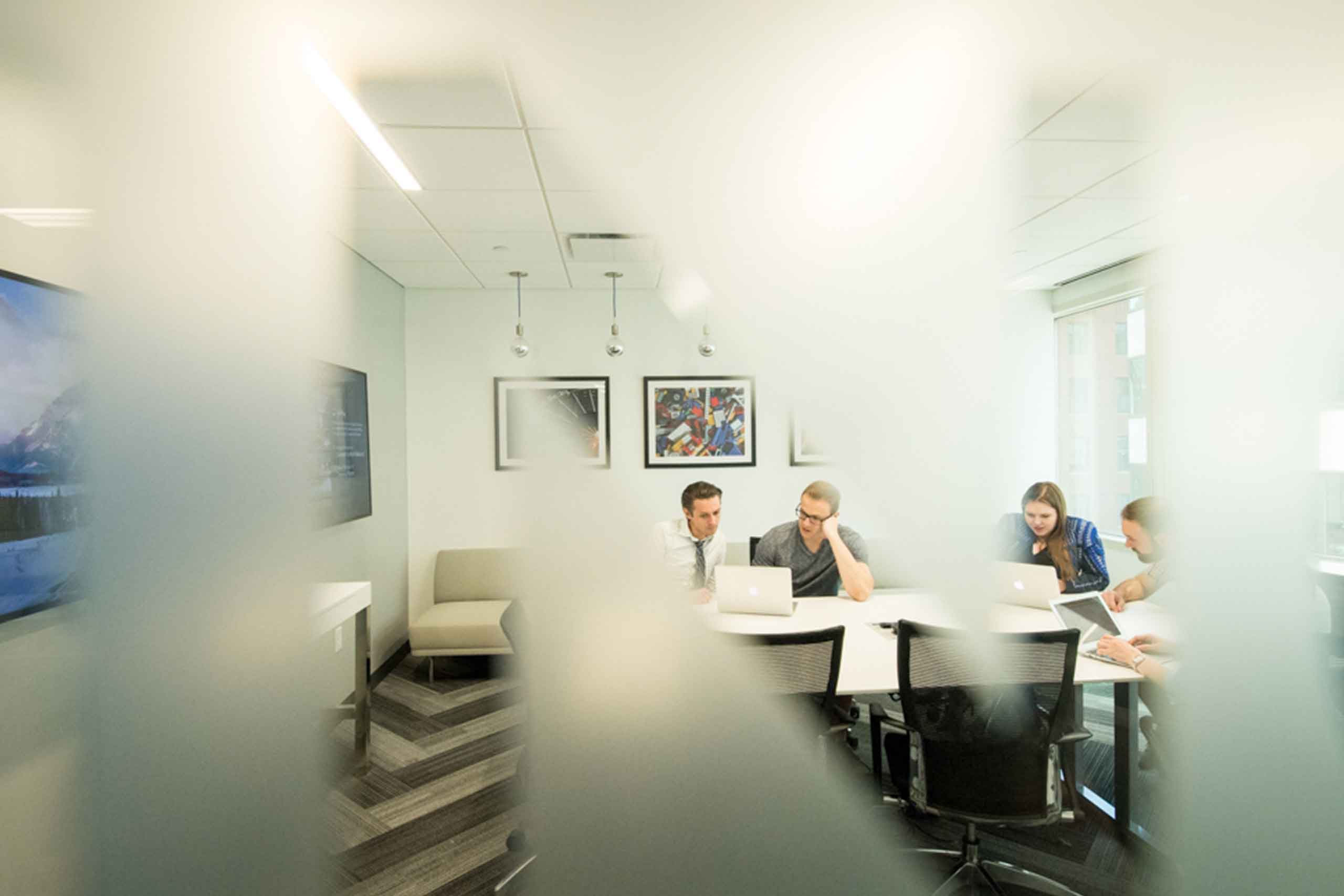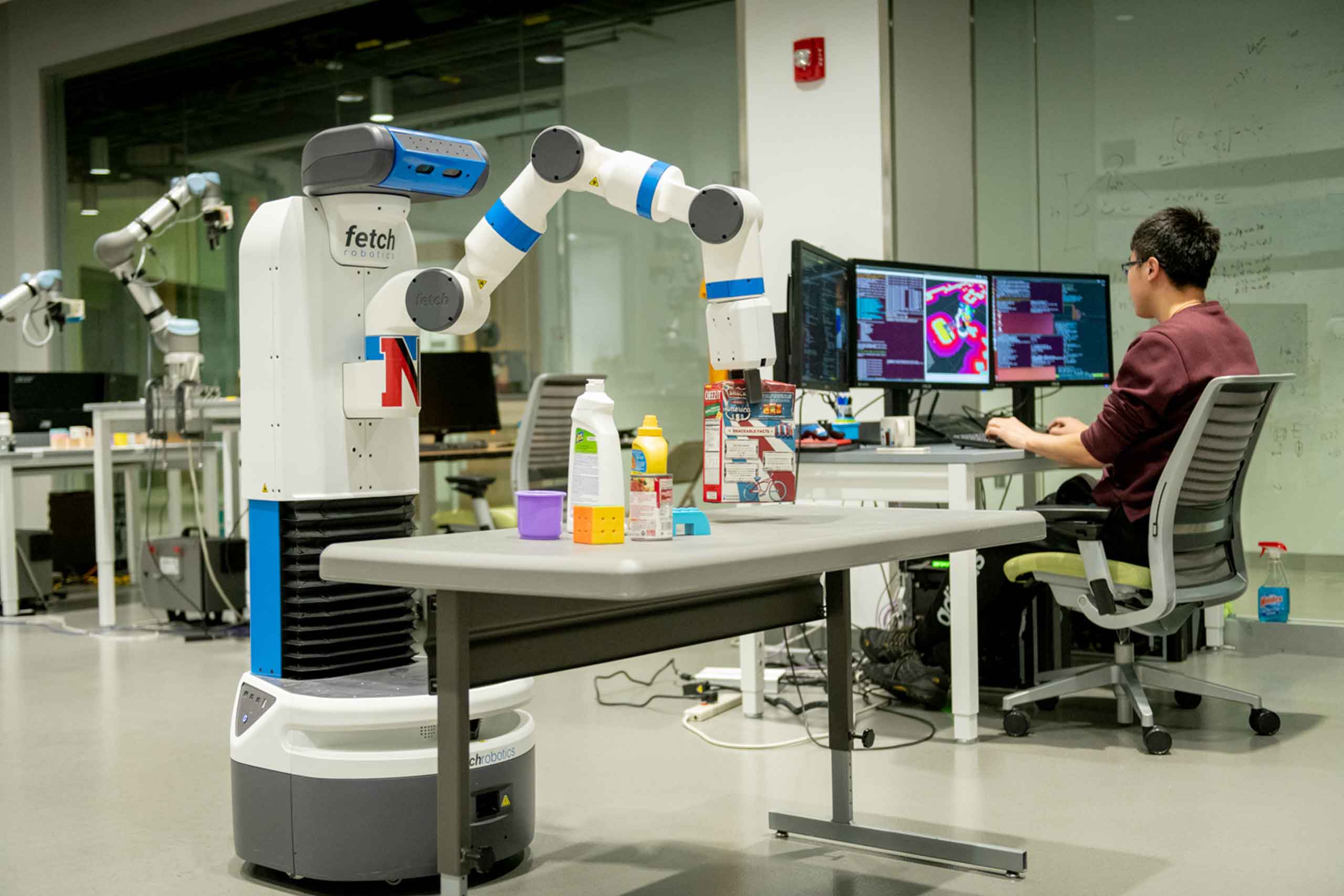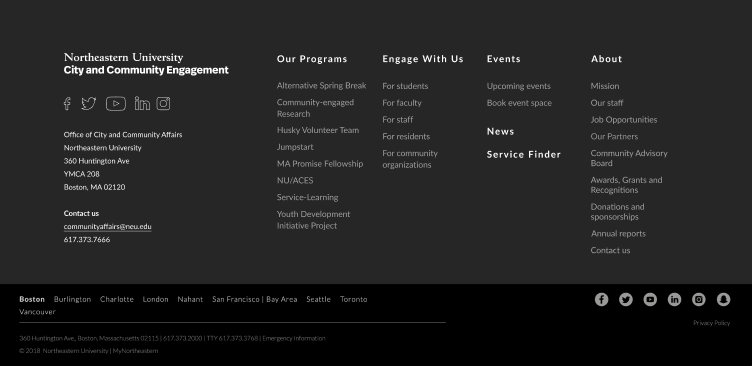

From the Align program to DraftKings, Margarita Gubanova found that the best computer science happens through collaboration

Tue 08.31.21 / Madelaine Millar

From the Align program to DraftKings, Margarita Gubanova found that the best computer science happens through collaboration
Tue 08.31.21 / Madelaine Millar
Tue 08.31.21 / Madelaine Millar
Tue 08.31.21 / Madelaine Millar


From the Align program to DraftKings, Margarita Gubanova found that the best computer science happens through collaboration

Tue 08.31.21 / Madelaine Millar

From the Align program to DraftKings, Margarita Gubanova found that the best computer science happens through collaboration
Tue 08.31.21 / Madelaine Millar
Tue 08.31.21 / Madelaine Millar
Tue 08.31.21 / Madelaine Millar
Margarita Gubanova never planned to be a computer scientist. She was born in Russia to a family of lawyers. Fully intending to follow in their footsteps, she completed her undergrad at Northeastern in political science.
After taking two computer science classes as an undergrad — “Computer Science and Its Applications,” and “Fundamentals of Computer Science 1” — Gubanova realized her passions lay elsewhere.
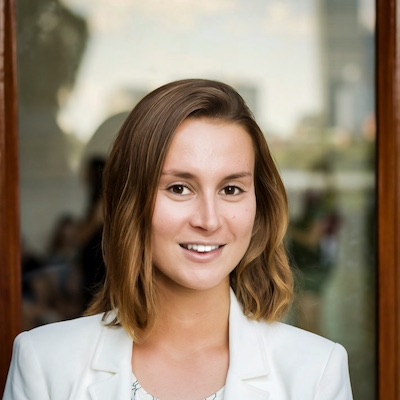 Margarita Gubanova
Margarita Gubanova“I really, really loved it. That’s when I saw the formulas and I was like, oh my god, this is amazing. Computers can do so many things for you,” Gubanova said.
Gubanova declared a minor in computer science, and she says she was interested in pursuing a graduate degree, but she didn’t think she could do so without a bachelor’s in a related field. That’s when Professor Olin Shivers mentioned Align to her, the innovative Khoury College of Computer Sciences program designed to provide a pathway to a master’s degree in computer science for people with an undergraduate degree in a non-technical field.
“Because I don’t have any technical background, I wasn’t sure that I could handle the pressure and the technical side of computer science,” said Gubanova. When she talked to Align advisors and other students, though, she could tell there would be support along the way. “Everything is just aligned and adjusted to people who don’t really have a background in technical specialties,” she explained.
Despite her trepidations, Gubanova found the program to be a perfect fit. Align offers bridge courses to help prepare students for graduate-level coursework, which helped Gubanova to deal with the learning curve of an entirely new field. “What I really like in computer science is the problem solving…(Align) gave us problems that you would face in the real world, but simpler.” explained Gubanova.
During her time in Align, Gubanova completed one co-op as a software development intern with the travel technology company Sabre. She worked on the back end developing microservices, a type of computer science architecture that allows large, complex applications to deliver products quickly, frequently, and reliably. This experience built on her work as a data quality specialist for the health insurance company Commonwealth Care Alliance, a position she had held during the time between her undergraduate graduation and her enrollment in Align. Gubanova had quickly noticed that manually reviewing hundreds of spreadsheet rows was taxing and inefficient, so she coded a set of macros to highlight mistakes in real-time.
“All of my experience contributed to me realizing how CS can automate what we do every day,” said Gubanova. “(For example,) I recently created an AWS Lambda function (an Amazon code running service which is triggered automatically by events like the addition of an apartment listing) that is triggered every five minutes to check a website for an available apartment that me and my boyfriend wanted to rent. We told management that we are interested in the apartment, but they said it’s first come first serve and we didn’t want to miss the chance to rent it, so that automated service would email me when that apartment becomes available.”
One of the most valuable elements of Gubanova’s Align experience was the collaboration with classmates, who ranged from chemists and physicists to digital marketers and recruiters. Gubanova found that each brought a unique perspective to the program.
“I feel like we’re approaching problems differently. When you collaborate with people like that, it definitely helps you grow even more,” said Gubanova. “The people that I’ve met in the Align program have definitely helped me grow professionally and personally.”
That same collaborative spirit is one of Gubanova’s favorite things about her current position as a front-end software developer at the online sports betting company DraftKings. Gubanova works on the common platform team, developing components like user authentication, and sign-up and login pages. Because she works on the front end, Gubanova usually gets to see the results of her work right away, which she finds hugely rewarding. “If you change from a full web screen to a cell phone, you will see a lot of buttons cutting off, the page will be going into the background, stuff like that. That’s something that I’m fixing in my day-to-day job, which is cool because the (user) experience is definitely better,” said Gubanova.
DraftKings uses a ticket system to address bugs and perform software upgrades. When tackling a new project—for instance, adding a new menu to the DraftKings website or resolving a bug—one person thinks up a solution, a second person implements it, and a third person reviews it; the fix also goes through functional testing before the ticket is closed. Gubanova enjoys a lot of freedom to pick her own tickets, and regularly ends up working on each step in that process.
“It’s a lot of steps, but it’s really organized,” she said. She was also excited to find the same collaborative spirit at DraftKings that she had found in the Align program. “It’s one of the things that I was originally attracted to; the environment is great, and everyone is friendly, smart, and collaborative.” DraftKings benefits such as an onsite barbershop and nail salon provided another perk.
Gubanova graduated from the Align program in December, and she looks back fondly on her experience. She hopes that other people considering making the switch to computer science know that they aren’t alone; people like her have successfully made the switch, and the support structures exist for them to do it too.
Margarita Gubanova never planned to be a computer scientist. She was born in Russia to a family of lawyers. Fully intending to follow in their footsteps, she completed her undergrad at Northeastern in political science.
After taking two computer science classes as an undergrad — “Computer Science and Its Applications,” and “Fundamentals of Computer Science 1” — Gubanova realized her passions lay elsewhere.
 Margarita Gubanova
Margarita Gubanova“I really, really loved it. That’s when I saw the formulas and I was like, oh my god, this is amazing. Computers can do so many things for you,” Gubanova said.
Gubanova declared a minor in computer science, and she says she was interested in pursuing a graduate degree, but she didn’t think she could do so without a bachelor’s in a related field. That’s when Professor Olin Shivers mentioned Align to her, the innovative Khoury College of Computer Sciences program designed to provide a pathway to a master’s degree in computer science for people with an undergraduate degree in a non-technical field.
“Because I don’t have any technical background, I wasn’t sure that I could handle the pressure and the technical side of computer science,” said Gubanova. When she talked to Align advisors and other students, though, she could tell there would be support along the way. “Everything is just aligned and adjusted to people who don’t really have a background in technical specialties,” she explained.
Despite her trepidations, Gubanova found the program to be a perfect fit. Align offers bridge courses to help prepare students for graduate-level coursework, which helped Gubanova to deal with the learning curve of an entirely new field. “What I really like in computer science is the problem solving…(Align) gave us problems that you would face in the real world, but simpler.” explained Gubanova.
During her time in Align, Gubanova completed one co-op as a software development intern with the travel technology company Sabre. She worked on the back end developing microservices, a type of computer science architecture that allows large, complex applications to deliver products quickly, frequently, and reliably. This experience built on her work as a data quality specialist for the health insurance company Commonwealth Care Alliance, a position she had held during the time between her undergraduate graduation and her enrollment in Align. Gubanova had quickly noticed that manually reviewing hundreds of spreadsheet rows was taxing and inefficient, so she coded a set of macros to highlight mistakes in real-time.
“All of my experience contributed to me realizing how CS can automate what we do every day,” said Gubanova. “(For example,) I recently created an AWS Lambda function (an Amazon code running service which is triggered automatically by events like the addition of an apartment listing) that is triggered every five minutes to check a website for an available apartment that me and my boyfriend wanted to rent. We told management that we are interested in the apartment, but they said it’s first come first serve and we didn’t want to miss the chance to rent it, so that automated service would email me when that apartment becomes available.”
One of the most valuable elements of Gubanova’s Align experience was the collaboration with classmates, who ranged from chemists and physicists to digital marketers and recruiters. Gubanova found that each brought a unique perspective to the program.
“I feel like we’re approaching problems differently. When you collaborate with people like that, it definitely helps you grow even more,” said Gubanova. “The people that I’ve met in the Align program have definitely helped me grow professionally and personally.”
That same collaborative spirit is one of Gubanova’s favorite things about her current position as a front-end software developer at the online sports betting company DraftKings. Gubanova works on the common platform team, developing components like user authentication, and sign-up and login pages. Because she works on the front end, Gubanova usually gets to see the results of her work right away, which she finds hugely rewarding. “If you change from a full web screen to a cell phone, you will see a lot of buttons cutting off, the page will be going into the background, stuff like that. That’s something that I’m fixing in my day-to-day job, which is cool because the (user) experience is definitely better,” said Gubanova.
DraftKings uses a ticket system to address bugs and perform software upgrades. When tackling a new project—for instance, adding a new menu to the DraftKings website or resolving a bug—one person thinks up a solution, a second person implements it, and a third person reviews it; the fix also goes through functional testing before the ticket is closed. Gubanova enjoys a lot of freedom to pick her own tickets, and regularly ends up working on each step in that process.
“It’s a lot of steps, but it’s really organized,” she said. She was also excited to find the same collaborative spirit at DraftKings that she had found in the Align program. “It’s one of the things that I was originally attracted to; the environment is great, and everyone is friendly, smart, and collaborative.” DraftKings benefits such as an onsite barbershop and nail salon provided another perk.
Gubanova graduated from the Align program in December, and she looks back fondly on her experience. She hopes that other people considering making the switch to computer science know that they aren’t alone; people like her have successfully made the switch, and the support structures exist for them to do it too.
Margarita Gubanova never planned to be a computer scientist. She was born in Russia to a family of lawyers. Fully intending to follow in their footsteps, she completed her undergrad at Northeastern in political science.
After taking two computer science classes as an undergrad — “Computer Science and Its Applications,” and “Fundamentals of Computer Science 1” — Gubanova realized her passions lay elsewhere.
 Margarita Gubanova
Margarita Gubanova“I really, really loved it. That’s when I saw the formulas and I was like, oh my god, this is amazing. Computers can do so many things for you,” Gubanova said.
Gubanova declared a minor in computer science, and she says she was interested in pursuing a graduate degree, but she didn’t think she could do so without a bachelor’s in a related field. That’s when Professor Olin Shivers mentioned Align to her, the innovative Khoury College of Computer Sciences program designed to provide a pathway to a master’s degree in computer science for people with an undergraduate degree in a non-technical field.
“Because I don’t have any technical background, I wasn’t sure that I could handle the pressure and the technical side of computer science,” said Gubanova. When she talked to Align advisors and other students, though, she could tell there would be support along the way. “Everything is just aligned and adjusted to people who don’t really have a background in technical specialties,” she explained.
Despite her trepidations, Gubanova found the program to be a perfect fit. Align offers bridge courses to help prepare students for graduate-level coursework, which helped Gubanova to deal with the learning curve of an entirely new field. “What I really like in computer science is the problem solving…(Align) gave us problems that you would face in the real world, but simpler.” explained Gubanova.
During her time in Align, Gubanova completed one co-op as a software development intern with the travel technology company Sabre. She worked on the back end developing microservices, a type of computer science architecture that allows large, complex applications to deliver products quickly, frequently, and reliably. This experience built on her work as a data quality specialist for the health insurance company Commonwealth Care Alliance, a position she had held during the time between her undergraduate graduation and her enrollment in Align. Gubanova had quickly noticed that manually reviewing hundreds of spreadsheet rows was taxing and inefficient, so she coded a set of macros to highlight mistakes in real-time.
“All of my experience contributed to me realizing how CS can automate what we do every day,” said Gubanova. “(For example,) I recently created an AWS Lambda function (an Amazon code running service which is triggered automatically by events like the addition of an apartment listing) that is triggered every five minutes to check a website for an available apartment that me and my boyfriend wanted to rent. We told management that we are interested in the apartment, but they said it’s first come first serve and we didn’t want to miss the chance to rent it, so that automated service would email me when that apartment becomes available.”
One of the most valuable elements of Gubanova’s Align experience was the collaboration with classmates, who ranged from chemists and physicists to digital marketers and recruiters. Gubanova found that each brought a unique perspective to the program.
“I feel like we’re approaching problems differently. When you collaborate with people like that, it definitely helps you grow even more,” said Gubanova. “The people that I’ve met in the Align program have definitely helped me grow professionally and personally.”
That same collaborative spirit is one of Gubanova’s favorite things about her current position as a front-end software developer at the online sports betting company DraftKings. Gubanova works on the common platform team, developing components like user authentication, and sign-up and login pages. Because she works on the front end, Gubanova usually gets to see the results of her work right away, which she finds hugely rewarding. “If you change from a full web screen to a cell phone, you will see a lot of buttons cutting off, the page will be going into the background, stuff like that. That’s something that I’m fixing in my day-to-day job, which is cool because the (user) experience is definitely better,” said Gubanova.
DraftKings uses a ticket system to address bugs and perform software upgrades. When tackling a new project—for instance, adding a new menu to the DraftKings website or resolving a bug—one person thinks up a solution, a second person implements it, and a third person reviews it; the fix also goes through functional testing before the ticket is closed. Gubanova enjoys a lot of freedom to pick her own tickets, and regularly ends up working on each step in that process.
“It’s a lot of steps, but it’s really organized,” she said. She was also excited to find the same collaborative spirit at DraftKings that she had found in the Align program. “It’s one of the things that I was originally attracted to; the environment is great, and everyone is friendly, smart, and collaborative.” DraftKings benefits such as an onsite barbershop and nail salon provided another perk.
Gubanova graduated from the Align program in December, and she looks back fondly on her experience. She hopes that other people considering making the switch to computer science know that they aren’t alone; people like her have successfully made the switch, and the support structures exist for them to do it too.
Margarita Gubanova never planned to be a computer scientist. She was born in Russia to a family of lawyers. Fully intending to follow in their footsteps, she completed her undergrad at Northeastern in political science.
After taking two computer science classes as an undergrad — “Computer Science and Its Applications,” and “Fundamentals of Computer Science 1” — Gubanova realized her passions lay elsewhere.
 Margarita Gubanova
Margarita Gubanova“I really, really loved it. That’s when I saw the formulas and I was like, oh my god, this is amazing. Computers can do so many things for you,” Gubanova said.
Gubanova declared a minor in computer science, and she says she was interested in pursuing a graduate degree, but she didn’t think she could do so without a bachelor’s in a related field. That’s when Professor Olin Shivers mentioned Align to her, the innovative Khoury College of Computer Sciences program designed to provide a pathway to a master’s degree in computer science for people with an undergraduate degree in a non-technical field.
“Because I don’t have any technical background, I wasn’t sure that I could handle the pressure and the technical side of computer science,” said Gubanova. When she talked to Align advisors and other students, though, she could tell there would be support along the way. “Everything is just aligned and adjusted to people who don’t really have a background in technical specialties,” she explained.
Despite her trepidations, Gubanova found the program to be a perfect fit. Align offers bridge courses to help prepare students for graduate-level coursework, which helped Gubanova to deal with the learning curve of an entirely new field. “What I really like in computer science is the problem solving…(Align) gave us problems that you would face in the real world, but simpler.” explained Gubanova.
During her time in Align, Gubanova completed one co-op as a software development intern with the travel technology company Sabre. She worked on the back end developing microservices, a type of computer science architecture that allows large, complex applications to deliver products quickly, frequently, and reliably. This experience built on her work as a data quality specialist for the health insurance company Commonwealth Care Alliance, a position she had held during the time between her undergraduate graduation and her enrollment in Align. Gubanova had quickly noticed that manually reviewing hundreds of spreadsheet rows was taxing and inefficient, so she coded a set of macros to highlight mistakes in real-time.
“All of my experience contributed to me realizing how CS can automate what we do every day,” said Gubanova. “(For example,) I recently created an AWS Lambda function (an Amazon code running service which is triggered automatically by events like the addition of an apartment listing) that is triggered every five minutes to check a website for an available apartment that me and my boyfriend wanted to rent. We told management that we are interested in the apartment, but they said it’s first come first serve and we didn’t want to miss the chance to rent it, so that automated service would email me when that apartment becomes available.”
One of the most valuable elements of Gubanova’s Align experience was the collaboration with classmates, who ranged from chemists and physicists to digital marketers and recruiters. Gubanova found that each brought a unique perspective to the program.
“I feel like we’re approaching problems differently. When you collaborate with people like that, it definitely helps you grow even more,” said Gubanova. “The people that I’ve met in the Align program have definitely helped me grow professionally and personally.”
That same collaborative spirit is one of Gubanova’s favorite things about her current position as a front-end software developer at the online sports betting company DraftKings. Gubanova works on the common platform team, developing components like user authentication, and sign-up and login pages. Because she works on the front end, Gubanova usually gets to see the results of her work right away, which she finds hugely rewarding. “If you change from a full web screen to a cell phone, you will see a lot of buttons cutting off, the page will be going into the background, stuff like that. That’s something that I’m fixing in my day-to-day job, which is cool because the (user) experience is definitely better,” said Gubanova.
DraftKings uses a ticket system to address bugs and perform software upgrades. When tackling a new project—for instance, adding a new menu to the DraftKings website or resolving a bug—one person thinks up a solution, a second person implements it, and a third person reviews it; the fix also goes through functional testing before the ticket is closed. Gubanova enjoys a lot of freedom to pick her own tickets, and regularly ends up working on each step in that process.
“It’s a lot of steps, but it’s really organized,” she said. She was also excited to find the same collaborative spirit at DraftKings that she had found in the Align program. “It’s one of the things that I was originally attracted to; the environment is great, and everyone is friendly, smart, and collaborative.” DraftKings benefits such as an onsite barbershop and nail salon provided another perk.
Gubanova graduated from the Align program in December, and she looks back fondly on her experience. She hopes that other people considering making the switch to computer science know that they aren’t alone; people like her have successfully made the switch, and the support structures exist for them to do it too.

